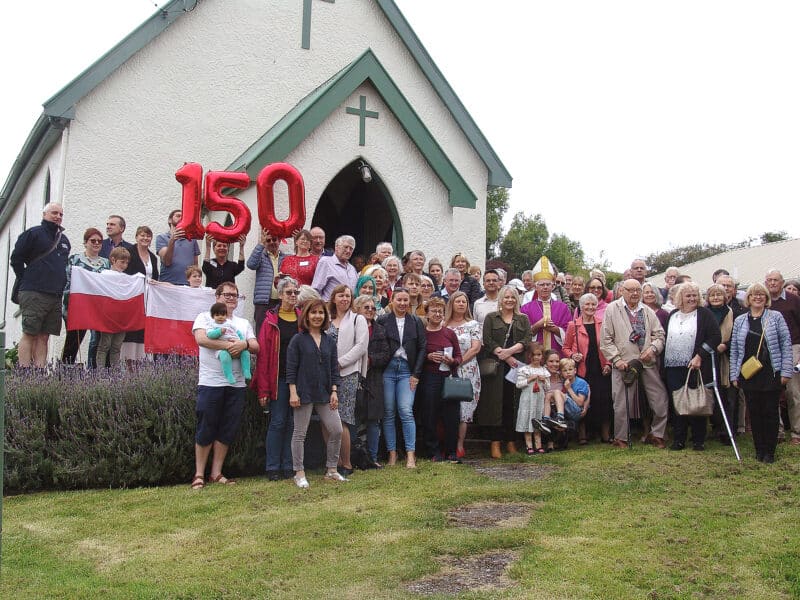By JEFF DILLON
The first Sunday of Advent saw a significant congregation gather at Mary, Queen of Peace church in Broad Bay on the Otago Peninsula to attend a Thanksgiving Mass celebrated by Bishop Michael Dooley of Dunedin.
This was a special gathering of members of the Polish community in the south and others who were somehow connected to that group. They were there to celebrate their connections to each other, to their native Poland, and also the old church.
2022 marked 150 years since the first 105 settlers, mainly from the Kociewie region in Poland, to come to southern New Zealand stepped ashore at Port Chalmers from the immigrant ship, Palmerston, on December 6, 1872. Most ended up in the Allanton and Waihola districts south of Dunedin helping to build the main trunk railway line to the south. Few knew any English, so the chance to gather and celebrate Sunday Mass together as a community was very important. While having to share religious facilities with other denominations to begin with, in 1899 the Poles built their own church at Waihola, which was named St Hyacinth, after a Polish saint.
By the 1940s, many of the families had moved on to other places, and the congregation had dwindled. In 1948, Dunedin Diocese decided that the church building could have a better use at Broad Bay, so it was cut in two and went through a major relocation exercise before being reunited on its present location and was renamed Mary, Queen of Peace. Its Polish origins, although known to some, peacefully went into a slumber.
However, by the 1980s and 1990s, new arrivals from Poland were about to have an impact. One of those was Cecylia Klobukowska from the Kociewie region near Gdansk. She initially came to Oamaru with her veterinarian husband and their young family before moving to Dunedin seven years later in the early 1990s. Mrs Klobukowska became involved in relief teaching, and it was on one of those stints that fate took a role. Her strong accent led to a question from another teacher in the staffroom about where she was from. When she declared her Polish heritage, the other teacher happened to mention about the origins of the church at Broad Bay and that the teacher from the area had a key to it.
When Mrs Klobukowska visited the church and went inside she was deeply moved by the experience of what she found there and the connection. That set her on a path of discovery. She and a few other Polish friends began to advertise in the newspaper to find descendants from those original families.
An informal group was put on a more permanent basis in 1998 when Mrs Klobukowska joined with Ewa Rozecki-Pollard and some others to form the Polish Heritage of Otago and Southland Charitable Trust (POHOS).
One aspect of their work was securing a more recognised connection with the Broad Bay church. It was the most tangible existing link to the early Polish settlers, so Dunedin Diocese was asked to secure that connection and allow the Polish community to play their part in caring for the church. That was achieved, leading to maintenance and upgrading work by members of the POHOS group.
Before the Thanksgiving Mass this year, a special effort over several weeks had been undertaken by volunteers to paint and spruce up all the church inside and out. Money was raised and many hours were spent painting and repairing to good effect.
In his homily, Bishop Dooley pointed to the significance of having the Thanksgiving Mass on the first Sunday of Advent. He noted that Advent stems from a Latin word which means a “coming” or “arrival”. For those first Polish settlers they certainly were coming to a new land, a new culture, but also a new beginning and a new life. They would have been very aware of what the season was all about. They had faith and dedication to God and a strong prayer life.
The dedication of the modern Polish immigrants together with the descendants of the families from the Palmerston have seen many successes for their efforts since the formation of POHOS. While Mrs Klobukowska felt that the history of the church grew on her it also enabled her to engage in a journey of discovery that opened up new insights. Her efforts have led to recognition from the Polish government. For her work on promoting and preserving Polish Heritage of Otago and Southland Mrs Klobukowska received the Gold Cross of Merit (2008) and the Knight’s Cross of the Order of Merit of the Republic of Poland (2018), both from the Polish president.
On the Saturday evening before the Sunday Mass, a gala dinner was held at Toitu Otago Settlers Museum . There Grzegorz Kowal, the Polish Ambassador, presented seven participants with special medals for contributing their skills to promoting the Polish story in the South. A founding member, and present-day POHOS chairperson, Mrs Rozecki-Pollard, received an “Honorary Medal of Merit for Polish Culture”. Six similar medals were awarded to Anna McCreath Munro, Edward Sakowski, Marek Tomaszkiewicz, Robyn Belton, Bozena Haug, and Peter Tait.
After the Mass, a bus tour took place down to the Allanton and Waihola area to see the original cottages and to visit the graves. On December 6, to mark the actual anniversary day of the arrivals, a special 150th Anniversary Plaque was unveiled in Port Chalmers.
Photo: The congregation gathers with Bishop Michael Dooley after the Mass, with Cecylia Klobukowska on the far right in the blue jacket

[…] Source […]